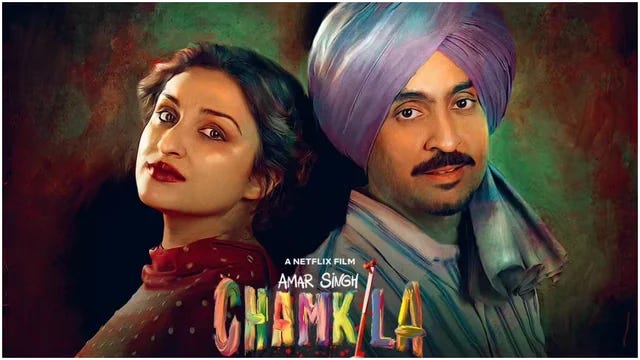Chamkila / Conscience
Amar Singh Chamkila rattled the public conscience in more than one ways.
Note: Though this writeup contains some spoilers, I don’t think it will impact the movie experience. However, I recommend this post to those who have already seen the movie. FYI Grammatical fine tuning of this post was done using ChatGPT
I received a movie recommendation from a friend during a casual conversation while scrolling through Netflix on his smart TV. Though I was somewhat interested, I ended up watching Top Gun Maverick last week. This week, I decided to catch up on Amar Singh Chamkila as the song “Vida Karo” was somewhat viral on Instagram.
The Movie
The movie is set in 1980s Punjab, where performers singing songs with raunchy lyrics were quite popular. During the same period, Sikh militancy/terrorism was also quite rampant. Amar Singh Chamkila shot to fame during this period.
Coming from the lower strata of society, he had truly shattered the glass ceiling in performing arts. However, he doesn’t seem to be an ideal personality. He gets married to his co-singer through deceit but still manages to manipulate the public to accept his second marriage. He leaves his first wife shattered though he promises to support her financially.
Slowly, the government and the Sikh terrorists lay their eyes on this man due to his popularity and his potential to “pollute” the public conscience. However, Chamkila was not a perverted individual per se. He figured out what the public wanted and excelled in an art form that catered to the base thoughts of the public.
At some point, he ends up singing devotional songs (which become popular nevertheless), but the public demands that he sing his earlier raunchy songs during his public events. No matter how he calibrates his act, he is pressured by his fans, media, and religious elements to behave as per their standards.
Chamkila realizes that nothing makes sense and decides to behave as he sees fit. He decides to sing his songs without fear, and his better half joins hands with him. Finally, Chamkila is shot dead.
Conscience Keepers and Fear
The moot point is whether an affinity for raunchy songs needs to be fed by artists or not. However, the conscience keepers who claimed to preserve society’s conscience by controlling the consumption of cigarettes, alcohol, and sexually exciting content were enabling something far worse, i.e., violence and murder.
If the baseline is so low, then any conversation about conscience and decency in the realm of entertainment becomes a farce.
That said, the public must not be forced to follow a certain moral code just because the religious gurus prescribe it. Chamkila and his troupe believed that they made songs that the public would definitely love. And the sales figures of his music prove his point. But I still don't know where you can draw a line between conscience and freedom.
From what I can understand, Chamkila sang quite openly about extramarital sexual relationships and a vivid portrayal/objectification of women. If the movie has portrayed society accurately, one can notice that even women loved these songs. That still doesn’t quite justify the content that was popular. But killing and threatening a man for singing a song is quite regressive in a democratic free society.
It’s like putting hordes of people in jail for consuming porn in the internet age. As a viewer, I admire Chamkila for freeing himself from fear and continuing with his art. I loved it when he says that the world doesn’t work on the basis of logic. It’s quite true. He decided to live freely and allowed fate to decide whether the bullet would kill him or not.
Can a person choose to live without fear despite its tentacles surrounding his neck? That choice decides whether he’s doing justice to himself. Chains of conscience (as defined by gurus or gunmen) are often an excuse for the influential people to claim power and put down other competitors.
Every other parameter is just a matter of opinion.


